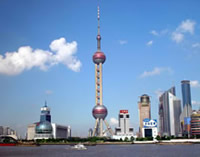|
|


ADVERTISEMENT
Buy Your own advertising
spaces!
.
Download Adobe Acrobat Reader to open [PDF] files.
Recent Visitors
China is building a bridge across the Danube
2010. 28 June
by Jonathan Holslag
(ft.com)
For those Europeans concerned with China's growing prowess, here is another reason to be alert. The Chinese are about to cross the Danube. Not with tanks or communist propaganda, but with cash and a charm offensive. The advance is mainly commercially motivated, but its economic support could be a blessing for weakened economies in the region. But if the European Union does not get its house in order, it risks losing political clout on its own doorstep.
The financial crisis has shifted China's economic diplomacy into a higher gear, and Beijing has used Expo 2010 in Shanghai to showcase its expanding relations with new European partners. This month the Greek government announced a multibillion-dollar investment agreement through which the Chinese will construct new container terminals and airports and participate in shipbuilding. Several Chinese companies have signed up to a special economic zone in Sofia, while Bulgaria's new centre-right government hopes to draw in more Chinese capital to compensate for dwindling western investments.
Dozens of Chinese companies also attended a round-table with the Romanian government at the Expo this month to attract fresh investments - and not without result. The China Development Bank pledged generous support for developing Romania's wind power. A leading contractor promised to build a new thermoelectric power plant, a project that might cost as much as €1bn (£800m, $1.2bn). Other companies are exploring investment in the country's agricultural and mining sector. Just as the Chinese pavilion at the Expo, "the Crown of the East", overshadows other modest contributions, so China is becoming an economic beacon for the struggling governments of Europe's periphery.
China considers eastern Europe an important economic bridgehead. Its ministry of commerce has established guidelines for new processing hubs to penetrate local markets, and thus circumvent possible EU trade restrictions. Developing eastern European countries welcome the chance to tempt China away from Asia and Africa, particularly in the sectors of distribution, construction, public services, mining and agriculture.
These growing commercial ties could have important political consequences, especially if Beijing's closer links with eastern Europe undermine the formulation of a more coherent EU policy towards China. During a 2009 trip to Europe, vice-president Xi Jinping's Romanian and Bulgarian hosts gave assurances that their eventual EU accession would be "beneficial" for China-EU relations. The complex chain of committees and informal discussions in the EU's decision-making process permits these countries to slow down protectionist measures and further restrain European demarches on human rights. On issues such as climate change they could even be closer to Beijing than to Brussels.
To date, China's economic footprint remains modest. But Beijing carefully cultivates the expectation of more investments and is a master in making financial aid look bigger than it is. Any such investment could be helpful for eastern European states hoping to dilute the conditions that often come attached when co-operating with the EU. During the recent presidential election in Ukraine, Yulia Tymoshenko campaigned with a $500m Chinese loan for infrastructure projects. She went on to lose, but her posturing clearly showed that China could win friends in strategically important nations. Even though Beijing stresses its traditional policy of non-interference, its economic policies will soon turn heads among elites in Europe's neighbourhood.
China's trade power cannot be turned back. In fact, it could create important opportunities for eastern Europe's development. So rather than trying to exclude China, Brussels should streamline its economic policies to consolidate influence in its periphery. Granted, eastern Europe will not be sucked into a Chinese sphere of influence any time soon. But China's growing presence will make it more difficult for the EU to achieve its own regional objectives. In this, China's rise challenges the EU to be more effective in translating its strained economic capabilities into political clout. And the longer Europe's economic crisis persists, the more desperate political elites will seek business to the east.
The writer is head of research at the Brussels Institute of Contemporary China Studies


